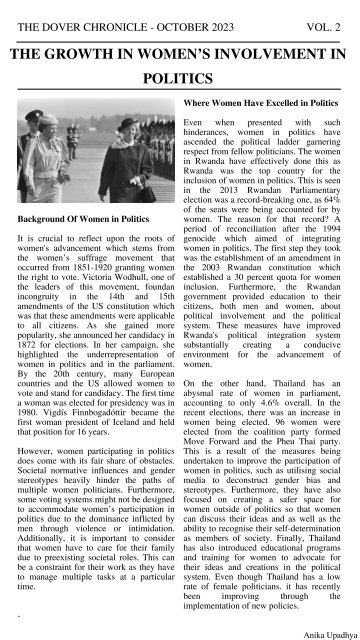THE DOVER CHRONICLE VOL 2
Create successful ePaper yourself
Turn your PDF publications into a flip-book with our unique Google optimized e-Paper software.
Anika Upadhya<br />
<strong>THE</strong> <strong>DOVER</strong> <strong>CHRONICLE</strong> - OCTOBER 2023 <strong>VOL</strong>. 2<br />
<strong>THE</strong> GROWTH IN WOMEN’S IN<strong>VOL</strong>VEMENT IN<br />
POLITICS<br />
Where Women Have Excelled in Politics<br />
Background Of Women in Politics<br />
It is crucial to reflect upon the roots of<br />
women's advancement which stems from<br />
the women’s suffrage movement that<br />
occurred from 1851-1920 granting women<br />
the right to vote. Victoria Wodhull, one of<br />
the leaders of this movement, foundan<br />
incongruity in the 14th and 15th<br />
amendments of the US constitution which<br />
was that these amendments were applicable<br />
to all citizens. As she gained more<br />
popularity, she announced her candidacy in<br />
1872 for elections. In her campaign, she<br />
highlighted the underrepresentation of<br />
women in politics and in the parliament.<br />
By the 20th century, many European<br />
countries and the US allowed women to<br />
vote and stand for candidacy. The first time<br />
a woman was elected for presidency was in<br />
1980. Vigdís Finnbogadóttir became the<br />
first woman president of Iceland and held<br />
that position for 16 years.<br />
However, women participating in politics<br />
does come with its fair share of obstacles.<br />
Societal normative influences and gender<br />
stereotypes heavily hinder the paths of<br />
multiple women politicians. Furthermore,<br />
some voting systems might not be designed<br />
to accommodate women’s participation in<br />
politics due to the dominance inflicted by<br />
men through violence or intimidation.<br />
Additionally, it is important to consider<br />
that women have to care for their family<br />
due to preexisting societal roles. This can<br />
be a constraint for their work as they have<br />
to manage multiple tasks at a particular<br />
time.<br />
-<br />
Even when presented with such<br />
hinderances, women in politics have<br />
ascended the political ladder garnering<br />
respect from fellow politicians. The women<br />
in Rwanda have effectively done this as<br />
Rwanda was the top country for the<br />
inclusion of women in politics. This is seen<br />
in the 2013 Rwandan Parliamentary<br />
election was a record-breaking one, as 64%<br />
of the seats were being accounted for by<br />
women. The reason for that record? A<br />
period of reconciliation after the 1994<br />
genocide which aimed of integrating<br />
women in politics. The first step they took<br />
was the establishment of an amendment in<br />
the 2003 Rwandan constitution which<br />
established a 30 percent quota for women<br />
inclusion. Furthermore, the Rwandan<br />
government provided education to their<br />
citizens, both men and women, about<br />
political involvement and the political<br />
system. These measures have improved<br />
Rwanda's political integration system<br />
substantially creating a conducive<br />
environment for the advancement of<br />
women.<br />
On the other hand, Thailand has an<br />
abysmal rate of women in parliament,<br />
accounting to only 4.6% overall. In the<br />
recent elections, there was an increase in<br />
women being elected. 96 women were<br />
elected from the coalition party formed<br />
Move Forward and the Pheu Thai party.<br />
This is a result of the measures being<br />
undertaken to improve the participation of<br />
women in politics, such as utilising social<br />
media to deconstruct gender bias and<br />
stereotypes. Furthermore, they have also<br />
focused on creating a safer space for<br />
women outside of politics so that women<br />
can discuss their ideas and as well as the<br />
ability to recognise their self-determination<br />
as members of society. Finally, Thailand<br />
has also introduced educational programs<br />
and training for women to advocate for<br />
their ideas and creations in the political<br />
system. Even though Thailand has a low<br />
rate of female politicians. it has recently<br />
been improving through the<br />
implementation of new policies.

















